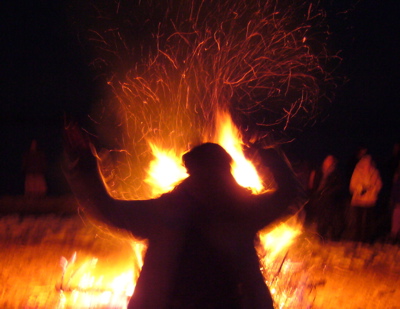“The Chefs of G~d
are cooking up a special stew
Just for you.”
~ Rumi

Who are you? I mean really.
Sounds like a simple question, but have you ever actually asked? I’ve posted on the subject before, and maybe once I know the answer, I’ll be done with the exploration. But that might not happen till the day I die! Or maybe it’s just at that precise moment, after my life has flashed before my eyes, that I’ll finally know just who I really am. Ha.
Amazing how we much we take it for granted, how many of us go through life without even pausing to ask that basic question. In my Fierce Light workshops, I often use a simple Zen excercise I learned from one of my inspirators, Roshi Enkyo O’Hara of the Village Zendo. In this partner practice, one person asks the other, “Who are you?” and after listening to the answer, says, with a little bow, “Thank you.” For five minutes. Which is actually a very very long time.
When I first tried it, I felt as if this practice expanded me, from my smaller self, to my larger, larger and still larger Self. At first, the obvious answers emerged- I’m a man, a filmmaker, a son, an artist, a sufi buddhist baha’i punk rocker – all the usual descriptors….but eventually I ran out, and things began to go further afield. I discovered that I am You, I am a blade of grass, a speck of dust, a dentist in millwaukee (that one surprised me!), a murderer, a lover of Love, an ant, a whale, everything that is was and could be…all of the above, and none of the above.
So who am I? I am a gorgeous stew, of the Great Big Enormous Beyond Enormity All Everything Totality, spiced up with the particulars of my souls journey ~ all I have been, known, seen, everything I do, think, feel and love. Especially all that I Love.
My unique ingredients are not who I am though. Rather, I am the dance of my elements, of mind body spirit and shadow, impermanent, ever changing, but rooted somehow in an essential Beingness, that is Me.
Sometimes we think we know someone, or we think we love someone, but what we really know or love, is just one small aspect of their stew. Perhaps the part we lack, or the part we celebrate in ourselves. Sometimes what we love is not even in their stew at all – it’s part of us that we’re projecting onto another. Yikes, that’s a recipe for disaster.
Love is about truly Seeing. Whether we are talking about another person, or ourselves, we cannot love unless we see, honestly, clearly, with an open, forgiving heart. Because we are all stews, it’s okay that part of our unique concoction includes our broken bits. We all have broken bits! In fact, those crunchy, gristly shadowy parts of us, with the proper mixing and spicing – add a dash of compassion, half a cup of letting go, three tablespoons of forgiveness – can be some of the most nutritious parts of our stew. The minerals and vitamins.
But we need to see those bits, bring them into the light, embrace them, release them, and allow them to be part of us. Both/and. Sometimes we need to release the shadows, sometimes we just need to shine the light into the basements of our consciousness, and see what’s there. If we try to repress the shadow bits of us, or deny them, they lurk around in our unconscious, sediment at the bottom of the pot, not properly integrated, and they can throw the mixture off.
We are continually seasoning our stews, and as we become more conscious, we can decide just what the flavour is we’re going for. With consciousness, we can align ourselves with the great Chef some call G~d, and start bringing forth those seasonings that we intuit we are here, on this plane, this planet, right now, to discover.
What spice, what ingredient, what pinch of this, or dash of that, would bring you into harmony? Or put you into the perfect off-kilter place you need to be right now- in case you are a little too balanced? Perhaps, in fact, there is nothing you need, other than what you have in this moment. Phew, that would be quite a feat – to accept who we are, and work with what we have.
More than anything, the key to being a tasty stew is truly integrating your ingredients, letting them flow together, play off each other, bring out the best in you, the whole You. It might seem unlikely – how can that broken heart ever be part of my flavouring, surely it’s going to turn me sour – but really, the choice is yours. As Viktor Frankl said, in “Man’s Search for Meaning”, we can lose everything except for one thing – our freedom to choose how we respond, to whatever comes our way.
The Chefs of G~d are cooking up a special stew – named You. Our small, individual stews are each a part of the Great Stew that constitutes all of creation, in fact all that is manifest and unmanifest, seen and unseen. Each one of us is an essential ingredient. This world, this universe, would not be the same without you. Thank-you for the vitamins, the minerals, the spices, the salty sour sweetness you bring to the mix.
Maybe it’s time to turn up the burner, and bring those juices of creation and destruction, tragedy and comedy, eros and pathos, compassion and ecstasy, love and limitless possibility, to a boil! What do you have to lose?

April 25, 2009
Categories: authenticity, love, spirituality, Uncategorized, Zen . Tags: Baha'i, buddhist, punk rock, Roshi Enkyo O'hara, Rumi, self knowing, spirituality, sufi, Viktor Frankl, village zendo, who are you, Zen . Author: Velcrow Ripper . Comments: 7 Comments






